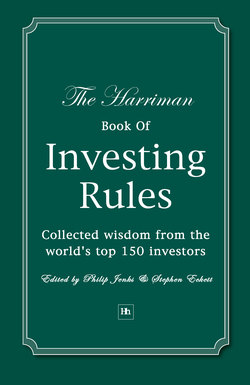Читать книгу The Harriman Book Of Investing Rules - Stephen Eckett - Страница 34
На сайте Литреса книга снята с продажи.
ОглавлениеAlexander Davidson
Alexander Davidson used to work as a share dealer, specialising in small, high-growth companies. Disillusioned with the biased advice that some City firms gave clients, he quit his job to write The City Share Pushers, a best-selling exposé which was made into a TV documentary and formed the basis of a motion on City practices in the House of Commons. Davidson now writes for International Financing Review, which specialises in new issues, and Vanguard Investor, which specialises in high tech stocks.
The City Share Pushers
How to Win in a Volatile Stock Market, Kogan Page, 2000
Stock Market Rollercoaster, John Wiley, 2001
How to avoid being a victim of stock manipulation
1. Do not over-trade.
It will cost you a fortune in commission costs. This is why most day traders lose money.
2. Never buy only on share tips.
Journalists often write these as a favour to PR agencies. They make the tips sound enticing, but the skill is often in the writing, not in the analysis or insight. Also, be wary of analysts’ recommendations, which are typically biased or outdated.
3. Be prepared to stag new issues.
If you invest in a new issue in shares, be prepared to sell out immediately after flotation if the institutional investors do.
4. Avoid penny shares in most cases.
Avoid penny shares unless you really understand the company and have a strong reason for investing. Small companies are more subject to market manipulation than their larger counterparts. They are relatively illiquid, with large spreads.
5. Do not take your broker’s recommendations at face value.
Many brokers have very limited qualifications and no real ability to understand a company, but simply bluff their way.
6. Never buy from share dealing firms abroad.
Dubious share promoters from abroad are still trying to get your money, sometimes initially via the internet. Put the phone down on them and don’t visit their web sites. If you deal, do not feel obliged to stick to the oral agreement.
7. Don’t rely on technical analysis.
It makes money for the gurus but does not work except to a limited extent in short term trading situations.
8. Avoid a poor investment proposition in a fashionable industry.
Do not be seduced into buying shares simply because they are in a fashionable industry. A broker can usually present a stock’s poor fundamentals in an attractive light. If the PE ratio is very high, he may say that this is normal for growth stocks. If it is low, he may say that this is an undervalued stock.
9. Be wary of stock recommendations on internet message boards.
Use internet chat room and message boards only as pointers for conducting your own research. They are full of manipulators trying to persuade you to buy and sell stocks because it suits their purposes.
10. Always think for half an hour before buying or selling.
Give any stock recommendation half an hour’s thought before you commit yourself, and make sure you have enough facts about the company at your finger tips.
